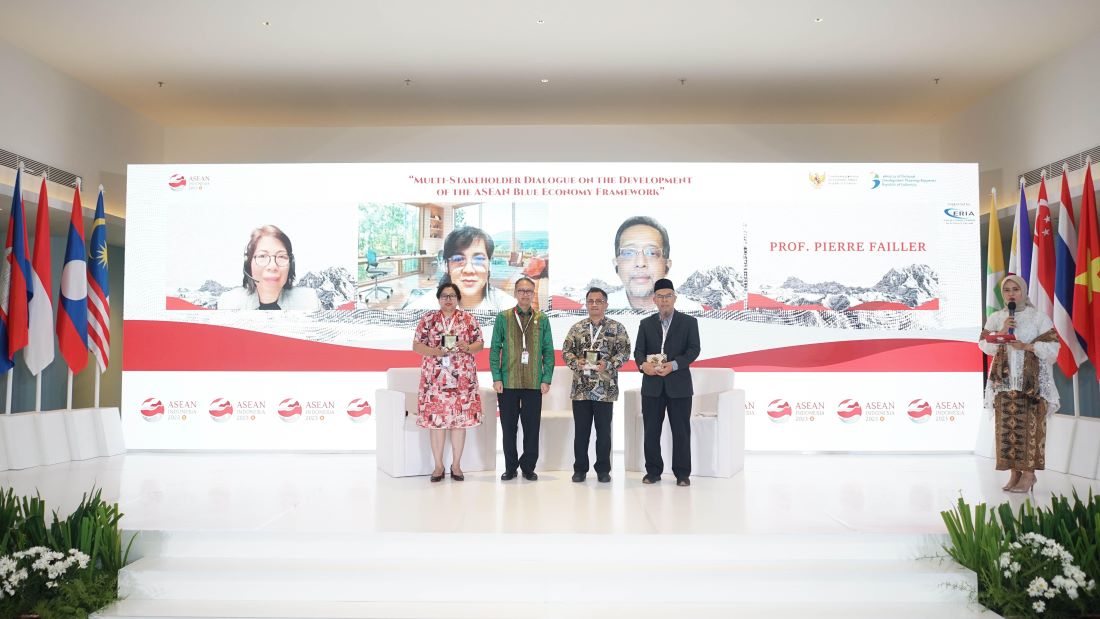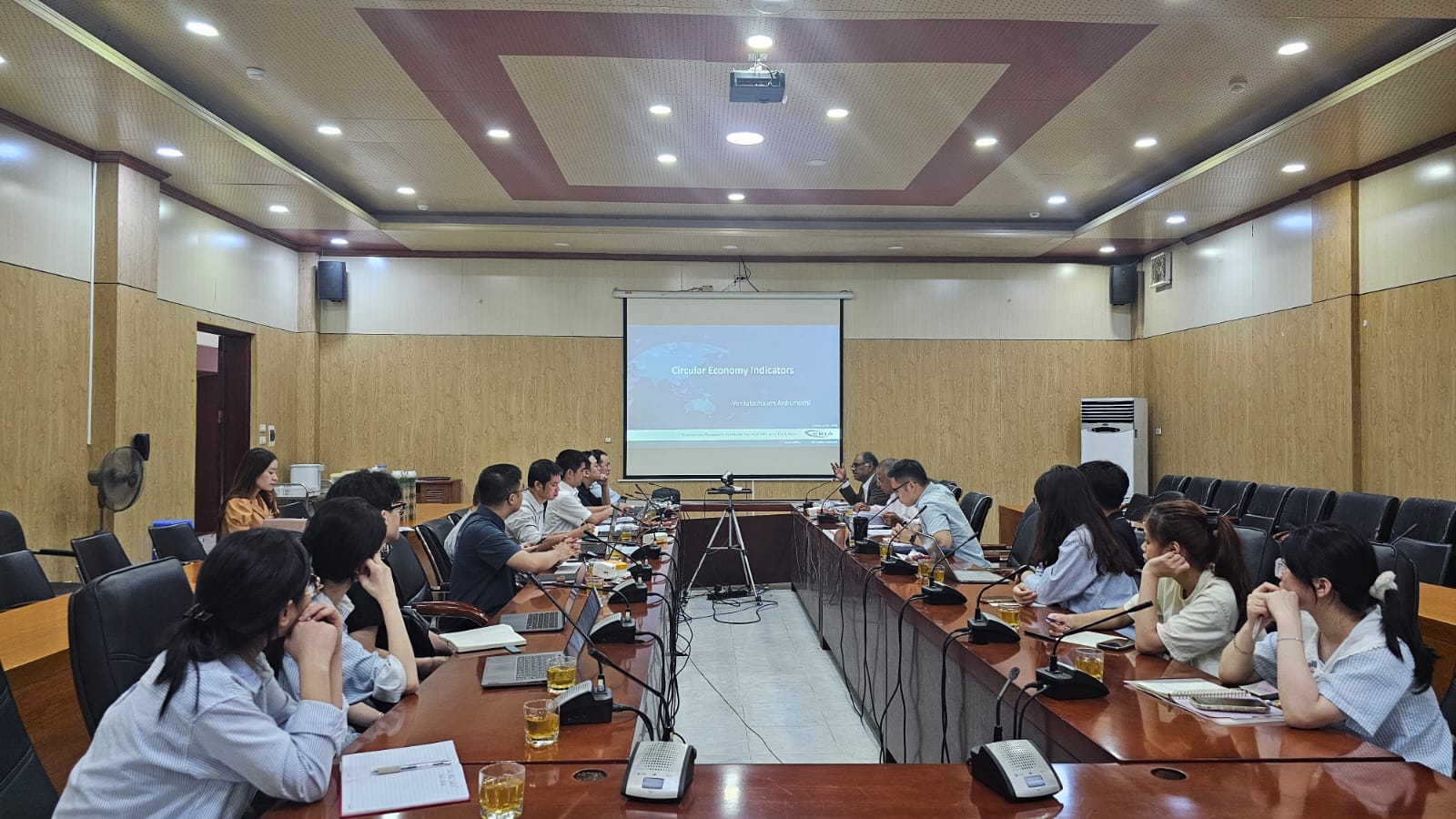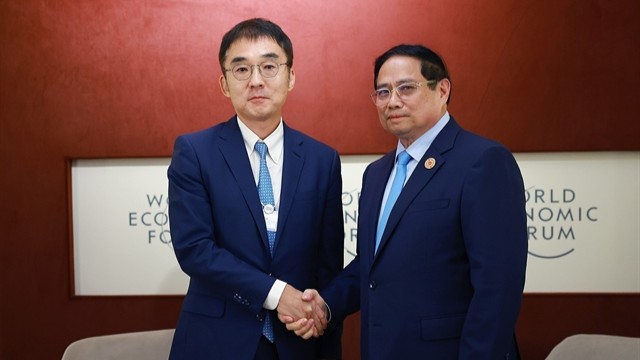ERIA Co-organises Multi-stakeholder Dialogue on the Development of the ASEAN Blue Economy Framework
Date:
1 March 2023Category:
NewsTopics:
ASEAN, Blue EconomyShare Article:
Print Article:
Belitung, 1 March 2023: The Economic Research Institute for ASEAN and East Asia (ERIA) co-organised the Multi-Stakeholder Dialogue on the Development of ASEAN Blue Economy Framework with Indonesia’s Ministry of National Development Planning (BAPPENAS) and Coordinating Ministry for Economic Affairs. The dialogue was a pre-event of the 43rd Meeting of the High-level Task Force on ASEAN Economic Integration and Related Meetings (HLTF-EI) attended by high-ranking economic officials from ASEAN Member States (AMS). The dialogue was attended by representatives from all AMS and related agencies, scholars, and professionals to share information, including on existing policies, activities, and challenges of Blue Economy in AMS. Participants exchanged ideas and perspectives, and pathways to address multiple barriers to realising the Blue Economy, which will serve as inputs in developing the ASEAN Blue Economy Framework.
In his opening remarks, His Excellency Dr Edi Prio Pambudi, Chairman of HLTF-EI and Deputy Minister for International Economic Cooperation of Coordinating Ministry for Economic Affairs of the Republic of Indonesia, emphasised the importance of the ASEAN Blue Economy Framework, and the need for AMS to work together and avoid unnecessary competition. He thanked ERIA for its exceptional contribution to setting up the dialogue.
In her keynote speech, Dr Amalia Adininggar Widyasanti, Deputy Minister for BAPPENAS, said that ASEAN needs a new engine of growth as many AMS are still struggling to escape the middle-income trap. She added that if ASEAN could unlock the full potential of Blue Economy, AMS would likely be the new ‘epicentrum’ of growth. Closing the session, she emphasised that in building the framework, ASEAN should focus on strengthening national policy and consider the diverse interests and priorities of AMS. She noted that the focus should be only on economic development and the new engine of growth, without touching on political and security issues. She thanked ERIA, BAPPENAS, and the Coordinating Ministry for Economic Affairs of the Republic of Indonesia for making the dialogue happen.
The dialogue began with a presentation from Prof Pierre Failler, UNESCO Chair in Blue Governance, who discussed global Blue Economy-related sectors and the potential for ASEAN to be at the forefront of Blue Economy in the Indo-Pacific region. Dr Intan Murnira Ramli, Policy Fellow of ERIA’s Policy Design Department, and Dr Laksmi Kusumawati, Acting Director for Trade of the ASEAN Blue Economy Framework Investment and International Economic Cooperation for BAPPENAS, moderated the first and second sessions, respectively.
Eight experts assessed the current development of Blue Economy in each AMS: Dr Teguh Sambodo (Indonesia), Prof Tamat Sarmidi (Malaysia), Ms Donah Baracol Pinhao (the Philippines), Ms Duangthip Chomprang (Thailand), Dr Aloun Phonvisay (Lao People’s Democratic Republic), Dr Vo Tri Thanh (Viet Nam), Mr Asnawi Kamis (Brunei Darussalam), and Dr Sothea Oum (Cambodia). Prof Luky Adrianto, Associate Professor and Dean of the Faculty of Fisheries and Marine Sciences at Bogor Agricultural University, and Dr Teguh Sambodo, Director of Industry, Tourism, and Creative Economics at National Development Planning Agency, served as discussants in the first and second sessions, respectively.
The two sessions provided significant insights that can be summarised as follows. First, AMS share a common understanding of the enormous economic potential inherent in Blue Economy, which is a critical means to encourage greater connectivity and advance geostrategic objectives. Second, although the progress of Blue Economy is not uniform across all AMS, each AMS is pursuing a variety of interests and strategies, reflecting unique strengths, having different kinds of risks and challenges and opportunities in implementing Blue Economy activities, the findings of which will be helpful in formulating the ASEAN Blue Economy Framework. The question-and-answer session was enlivened by extensive discussion on blue financing, cooperation mechanism, and policy design related to Blue Economy.
Moderating the first session, Dr Ramli said that investing in Blue Economy can open new avenues for innovation, entrepreneurship, and social and environmental impact, particularly for island and coastal communities. She added, however, that Blue Economy needs to remain a common objective for ASEAN, and each AMS should learn from each other to develop the potentials of ASEAN oceans. In the second session, Dr Kusumawati noted lack of awareness as a key challenge facing Blue Economy in ASEAN, as she highlighted the need to mainstream Blue Economy to promote public support. She said the creation of the ASEAN Blue Economy Framework is expected to facilitate cooperation, catalyse incentives in the region, and accelerate post–COVID-19 pandemic economic growth.

.jpg)
.jpg)
.jpg)
.jpg)







